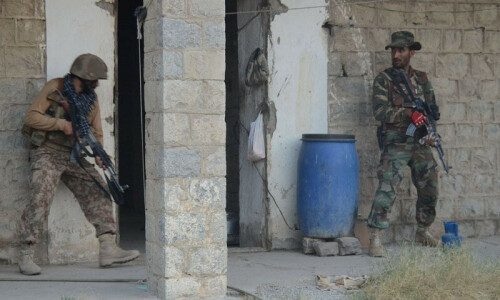Security forces killed 30 terrorists during three separate operations across Khyber Pakhtunkhwa, the military’s media wing said on Saturday.
In a statement, the Inter-Services Public Relations (ISPR) said that the first encounter took place in KP’s Lakki Marwat, where an intelligence-based operation (IBO) was carried out on the reported presence of terrorists.
During the operation, security personnel engaged the terrorists, killing 18 of them and leaving another six injured.
The second IBO was conducted in Karak, according to the statement. “In [the] ensuing fire exchange, eight khwarij were effectively neutralised by the security forces,” the ISPR said, using the term designating members of the Tehreek-i-Taliban Pakistan (TTP).
In the third encounter, security personnel conducted an (IBO) in the Khyber district’s Bagh area, where they killed four terrorists and injured two others. “Four khwarij including kharji ring leaders Aziz ur Rehman@ Qari Ismail and Mukhlis were sent to hell, while two khwarij got injured,” the ISPR said.
Weapons and ammunition were recovered from the slain terrorists, who “remained actively involved in numerous terrorist activities in the area against the security forces as well as killing of innocent civilians”, according to the ISPR.
“Sanitisation operations are being conducted to eliminate any other Kharji found in the area as the security forces of Pakistan are determined to wipe out the menace of terrorism from the country,” the statement concluded.
On January 17, five terrorists were killed in an IBO in the Khyber district’s Tirah area, the military’s media wing said. A statement from the ISPR said the IBO was conducted based on the reported presence of terrorists.
It added that the security forces engaged the terrorists and as a result, five, including ringleader Abidullah aka Turab, “were sent to hell” while one was apprehended.
Pakistan has recently witnessed an uptick in terror activities, especially in KP and Balochistan.
Terror attacks have increased since the banned Tehreek-i-Taliban Pakistan broke a fragile ceasefire agreement with the government in 2022.
A security report, released earlier this month by the Islamabad-based think tank Pak Institute for Peace Studies (PIPS), showed that in 2024, the number of terror attacks reached levels comparable to the security situation in 2014 or earlier.
It said that while terrorists no longer controlled specific territories inside Pakistan as they did in 2014, the prevailing insecurity in parts of KP and Balochistan was “alarming”.
It said that over 95 per cent of terrorist attacks recorded in 2024 were concentrated in KP and Balochistan.
KP recorded the highest number of terrorist incidents in the country in 2024, with 295 attacks. Meanwhile, attacks by various outlawed Baloch insurgent groups, primarily the BLA and the Balochistan Liberation Front (BLF), saw a staggering 119 per cent increase, accounting for 171 incidents in Balochistan, it said.















































